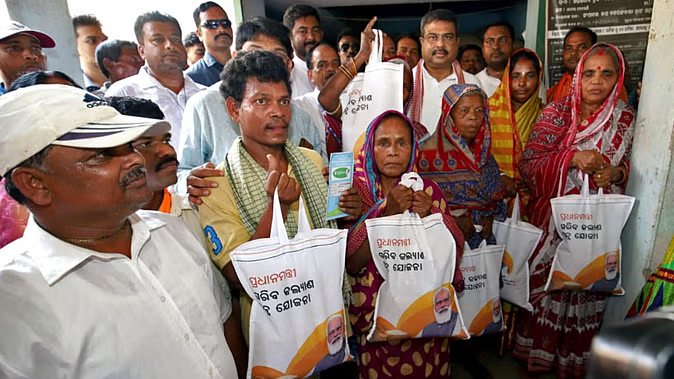PMGKAY: Preparations are being made to lay off ineligible people taking free ration, help of Income Tax Department to be taken

New Delhi| The government is preparing to identify such people under ‘Pradhan Mantri Garib Kalyan Anna Yojana’ (PMGKAY) who have been ineligible and have benefited from the scheme. There is news that now the help of Income Tax Department will be taken to identify such people.
The Income Tax Department will share its data with the Food Ministry to remove ineligible people from the list of beneficiaries under PMGKAY, an office order said. Under PMGKAY, free ration is given to those poor families who do not pay income tax. The government has made a provision of Rs 2.03 lakh crore for PMGKAY in the budget for FY 2025-26, which is higher than the revised estimate of Rs 1.97 lakh crore for the current financial year.
Pradhan Mantri Garib Kalyan Anna Yojana (PMGKAY) was launched with the specific objective of reducing the hardships faced by the poor and needy due to the economic impasses caused by the COVID-19 pandemic in the country. However, the government has extended the period of distribution of free food grains under PMGKAY for five years from January 1, 2024. According to CBDT, the Director General of Income Tax (System) will have the power to give information to the Joint Secretary of the Department of Food and Public Distribution (DFPD) in the Ministry of Consumer Affairs.

According to the new arrangement, DFPD will provide Aadhaar or PAN number along with the assessment year of tax to DGLT (System), New Delhi. If PAN or given Aadhaar are interconnected then DGIT (System) will respond to DFPD regarding the income determined as per the database of Income Tax Department. If the beneficiary’s Aadhaar number is not linked to any PAN in the income tax database, the DGIT (system) will inform the DFPD. The manner of such response and transaction of information will be decided by DGLT (System) and DFPD.
DGIT (System) will enter into an MoU (Memorandum of Understanding) with DFPD to facilitate the process of sharing data among themselves. The MoU will contain details of the method of exchange of data, confidentiality, mechanisms for safe protection of data, methods of destroying it after use, etc.










